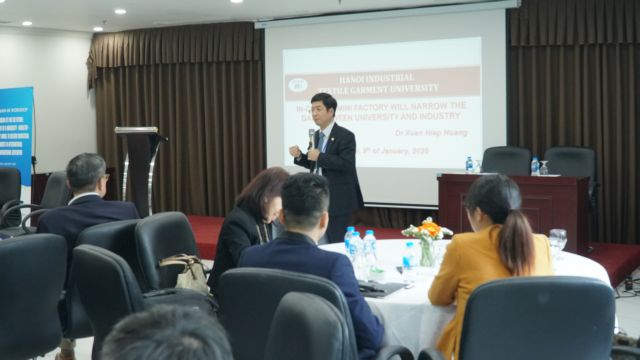 Society
Society


|
| Hoàng Xuân Hiệp, Rector of Hà Nội Textile and Garment Industry University, shares the connection between his students and the industry in a workshop in Hà Nội. — Photo Minh Hương |
HÀ NỘI — PhD students need to connect with industries to benefit the economy in Việt Nam, experts said at a recent workshop in Hà Nội.
Giang Mạnh Khôi, deputy director of the Institute of Technology Application, said: “Highly qualified human resources are always the leading factor for the success of a firm, with their outstanding innovations applied to the jobs. They should create a lot of value.”
However, Khôi said: “The connection between industry, universities and the Government is not yet tight in Việt Nam,” adding that as a result: “Graduates, as the core of the most firm’s R&D departments are less involved with the firms’ activities and don’t create much value."
Professor Raymond Lee, from Portsmouth University, told Việt Nam News: “Many PhD students just stay at university, studying to become lecturers,” adding: “They may not understand what the industries need.”
To solve the problem, eight Vietnamese universities and firms have worked with the UK’s Portsmouth University, Cardiff University and Greenwich University under the sponsorship of the British Council as part of a project named ‘Education Fit for the Future’ to promote the quality of internships and industrial job placement for post-graduate students, enabling them to become global citizens that meet the requirements of a future society.
Professor Lee told Việt Nam News: “The PhD students should work outside the university, so they can see and create innovations that society really needs.”
Mai Anh Tuấn, vice director of the National Centre for Technological Progress, Ministry Of Science and Technology (Nacentech), told Việt Nam News: “The universities produce a lot of PhD students that are not used by enterprises because they are trained with no real practical skills, and cannot meet the demand.”
In that case, Tuấn said: “Enterprises, universities and the Government face a lack of qualified human resources.”
The project focuses on research on job placement in the industry with the active participation of businesses, universities and the Government.
“There are many success stories in the UK when PhD students are connected with industries. But the UK and Việt Nam’s industries are quite different. We don’t have a lot of manufacturing industries or the strong presence of Asia (Asian firms) like Việt Nam,” said Professor Lee.
Regarding the project, Lee said: “We are in the very first stage.”
Among few examples of the connections possible, Hoàng Xuân Hiệp, Rector of Hà Nội Textile and Garment Industry University, which provided about 30 per cent of staff for the textile industry said: “We have two garment factories in the campus where our students can really work with partners and customers all over the world.”
Hiệp told Việt Nam News: “The garment section will keep being one of the best growing industries in Việt Nam. We are training people for the next level of success, making Việt Nam no longer an outsource destination for textile and garment products but a place where we can make the fashion products for the whole chain and also own a good brand.”
Hiệp said the university was now training its post-graduate and PhD students on virtual reality (VR) and augmented reality (AR) technology, as well as a lot of innovations in internet of things (IoT).
Tuấn from Nacentech said the project was an opportunity to connect PhD students, universities and industries. It would also help management agencies build a type of education that can fit all stakeholders in Việt Nam.
Nacentech’s leader said that: “The number of Vietnamese partners in the project would grow as most of them realise the importance of a high-level workforce for their future.”
It is not known how many PhD students have been trained so far and how many of them used in local industries. Ten years ago, the ministry of education and training targeted to train at least 20,000 PhD holders by 2020. However, it then had to terminate the project as after five years, less than one fifth of the students had been trained. — VNS




